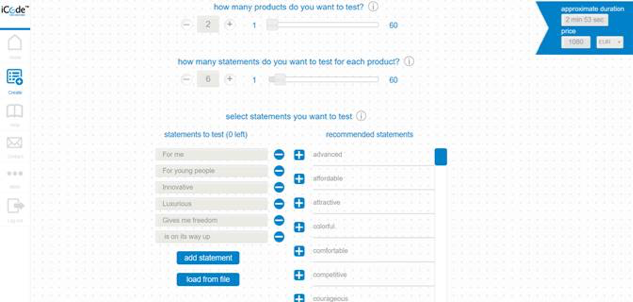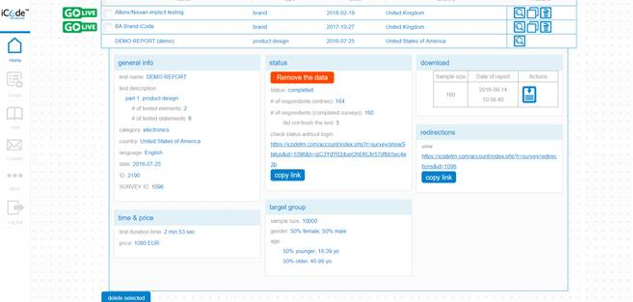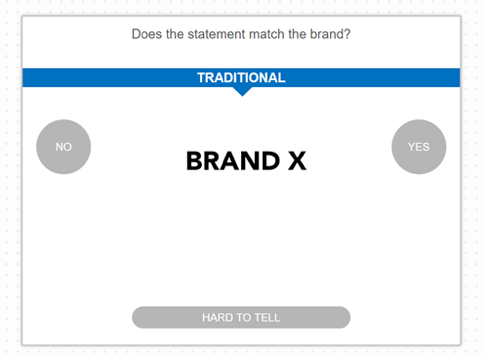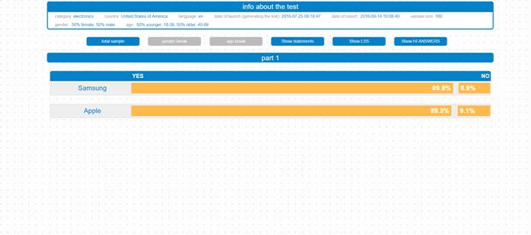Overview
iCode is an online survey tool which identifies the level of certainty in people’s opinions by measuring the speed of their response time. Built on academic research, iCode claim this method more accurately predicts consumers’ future behaviour (compared to asking traditional or explicit survey questions), on the premise that faster responses denote certainty and confidence, whereas slow ones betray a lack of conviction and indecision.
The online platform can be used self-serve, pay-as-you-go basis.
Pricing
iCode has a simple, transparent rate of €90 per ‘item’ asked (as of 01/05/2018). So if you wanted to test one concept across 10 brand attributes this would be €900. Equally, if you wanted to test 10 different packaging concepts across three attributes (i.e. 30 tests), that would be €2,700.
The €90 item price is fixed regardless of how many people who take part, but note that iCode does not source any research participants; you have to provide your own sample or use a third party provider.
Features
iCode can be used for pretty much any type of market research where you want to capture people’s attitudes, emotions and future intentions. Its main applications are in concept testing, NPD, pack design / claims, U&A and brand positioning. Because it’s a quant technique, iCode advise a minimum of 160 interviews per cell, and a typical survey of three brands being measured across eight attributes would take around 5-7 minutes to complete.
Obtaining a quote is easy using the self-serve platform:

iCode also has basic survey functionality built in (so you can capture and then split results say by demographics) but it can also be integrated with your favourite survey platform using redirect links. We linked it with Confirmit with no problems, although note the Confirmit data was not automatically passed through to iCode (this has to be done manually at the end of fieldwork).

When you get to the Reaction Time test section of the survey, participants are presented with the stimulus and given 3 answer options, e.g. Yes, No, Hard to tell. The survey works well on all devices from smartphones to laptops; we felt the best experience was on a smartphone. The test begins with an exercise to calibrate each participant’s personal reaction time.

Results are analysed in the online self-serve platform, which is intuitive and easy to use. Two outputs are provided; the results in terms of the traditional (explicit) %’s who answered Yes, No or Hard to tell, plus the crucial implicit score which tells you the % who confidently gave that answer.

What we like
In our experience, iCode is a simpler, cheaper and faster alternative to Implicit Association Testing (IAT), and has the advantage of capturing both an explicit and implicit response. We felt it gave us a better understanding of how people felt than traditional (explicit) measures alone.
It’s very easy for researchers to use, and studies can be priced up, deployed and analysed very quickly (results are available within a minute of completion). iCode also provide a handy list of templates with attributes pre-translated in 20 languages to help you launch international studies.
For the participants on our online communities, some reported it being refreshing to take part in a different type of study, and that it felt a bit like a game.
What can improve
However, some participants felt the Reaction Time test was clunky and monotonous; our advice is to keep down the number of items to a maximum of 15. Some also felt confused by the test and unsure about exactly what they were meant to do.
The survey link is also generic, meaning people could in theory complete the task multiple times (in practice this is very unlikely!).
Both of these are minor issues, but we would be wary of regularly subjecting our precious, long serving online community participants to iCode tests.
Bottom Line
iCode is a simple, easy to use tool for when you want to go beyond capturing explicit answers. It’s fast, good value and gives you an additional layer of understanding which adds value to your project.

